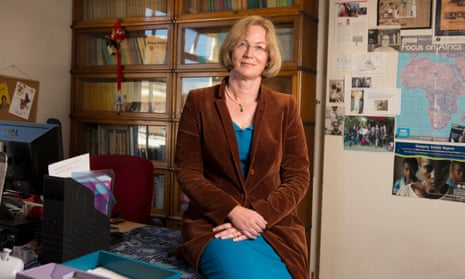When Christiana Ejura Attah, a barrister and academic from Nigeria, applied for a visa to speak at a renowned international African studies conference held at Cambridge University in September, she was denied entry to the UK.
British embassy officials decided Attah was likely not to return to Nigeria, because her husband, also an academic, had been granted a visa to the same three-day conference. Officials chose not to take into account that she would be leaving four children in Nigeria, or that she had a letter from her vice-chancellor at the Joseph Ayo Babalola University confirming her credentials and that she had been supported to make her UK visit with a £2,500 grant.
Attah, who had been due to present her research on the lack of legal protection for women and children in state camps for people made homeless by conflict in Nigeria, says: “I felt disappointed and humiliated”. She adds: “It is a shame that this could come from the UK. I would not know if this was a bias against women but the fact is that my husband and a junior male colleague from my department were given visas for this conference while I was not.”
Dr Insa Nolte, president of the African Studies Association of the UK, which hosted the conference, is outraged by Attah’s treatment, and in particular the apparent gender bias. “That visa officers think it appropriate to make their judgments based on a woman’s marital status in relation to her husband’s travel plans is staggering,” she says.
Attah’s case is far from isolated. At least 14 African academics couldn’t attend the same conference because of visa problems – the society suspects the actual number may be much higher. Academics from different disciplines across the UK are reporting similar frustrations, warning that Britain is quietly closing its doors and damaging vital academic collaboration.
“It is extremely worrying,” says Nolte, a reader in African studies at the University of Birmingham. “We’ve seen the refusal of people who are clearly credible and have absolutely no intention of staying in this country.”
Nolte and her colleagues wrote to everyone invited to the conference asking for evidence about visa refusals because they were shocked about the high numbers of African academics being turned away. Their findings, published on their website, suggested that academics who had provided all the right documents on time were given “dubious reasons” for being denied a visa.
Fana Gebresenbet Erda, from Addis Ababa University in Ethiopia, was denied a visa on the grounds there was no proof he would return to Ethiopia after the conference, even though he had a £2,000 grant to cover his visit. He cannot afford to buy a house on his academic salary and believes this was used as evidence of his unreliability.
Two applicants from the University of the Western Cape in South Africa and the University of Ibadan in Nigeria were refused visas on the grounds that they had insufficient personal funds. Yet they had shown that their visit to the UK was fully sponsored by the Harry Guggenheim Foundation, a US charity that supports young African scholars.
Nolte says these visa refusal problems are more than just an embarrassment. They threaten her discipline. “African studies in the UK is punching above its weight, but we can only continue to do so if we are able to maintain our links overseas,” she says. “We talk a lot now about decolonising knowledge of Africa, but it’s hard to know how that process can happen if we are forced to rely on academics in the UK.”
New fears are developing that similar visa problems will inhibit British collaboration with European academics after Brexit. In June, a presentation by a historian from Tunisia at an international conference on Brexit at Portsmouth University had to be cancelled when he didn’t get his visa in time. Organisers say it made them realise how burdensome applying for a visa can be.

One organiser, Christine Berberich, a senior lecturer in English literature at Portsmouth University, says: “Academics working in Britain need some reassurance that we will be able to continue proper collaboration after Brexit – with colleagues worldwide but especially our European partners. There is so much uncertainty at the moment and we need some guarantees.”
At Warwick University, a major international summit on discourse two weeks ago encountered similar problems. Academics from Russia and Serbia reported that they struggled with the UK visa system.
Johannes Angermuller, professor of discourse at Warwick, who co-organised the summit, says the future of such events may be in doubt. “The summit really matters because it connects people in different disciplines all over the world. But I’m not sure we will be able to host it in the UK again because the visa problems mean it may be too risky.”
He says he received an anonymous email from a British embassy officer asking him to verify a document for one academic’s visa. “It was a very difficult situation. I felt uncomfortable that it was anonymous and I wasn’t sure what was being asked of me. I felt they were treating me like an immigration officer.”
Jan Krasni, a researcher at Belgrade University who has co-authored research with British academics, including Angermuller, was keen to attend the Warwick summit but pulled out owing to the red tape and cost involved in applying for a visa. “What the UK is doing is appalling,” he says. “The bureaucracy is so complicated that it really makes one give up.”
He is angry that the British embassy in Serbia has outsourced visa applications to a private company, and that all applicants are expected to pay “a lot of money, which cannot be refunded, no matter what”. Including his flights, which have to be paid for before a visa is considered, the three-day conference would have cost him at least €900 (£790). The average monthly wage in Serbia is €400. “This makes knowledge inaccessible,” he says. “It is the best filter for the unwanted.”
Angermuller says international conferences are crucial for academics. “They provide opportunities for discussion and to share ideas, but probably most importantly you can make contact with researchers you might collaborate with in the future. Yes there is email but it is no substitute for real human exchange.”
A survey of fellows of the Royal Society, the British Academy, the Royal Academy of Engineering and the Academy of Medical Sciences, published in March, found that 95% had been involved in at least one international collaboration in the past five years. More than 60% of fellows said they had collaborated with an international colleague they had met at a conference.
Prof Ali Ansari, director of the institute of Iranian studies at St Andrews University, who wrote a report about problems with academic engagement with Iran for the British Council, says: “There should be a strategic decision made to facilitate academic exchanges. After all, one of Britain’s greatest assets is its higher education sector. But the atmosphere in UK visas and immigration now is extremely difficult, and there is no appetite for nuance or exceptions.”
A Home Office spokesman said: “All visa applications are considered on their individual merits but applicants must provide sufficient evidence to show they meet the requirements of the immigration rules.”
Ansari says Iranian academics wanting to come to the UK for a research visit must go through an arduous process. “The British embassy in Tehran doesn’t have the capacity to process all the visas, so academics end up having to go to Dubai and waiting there for a few days, which means a hotel. That is all very costly and time consuming.”
In the case of Iran it is, however, “a mutual problem”, he points out: British academics find it just as difficult to get a visa to travel there.

Comments (…)
Sign in or create your Guardian account to join the discussion